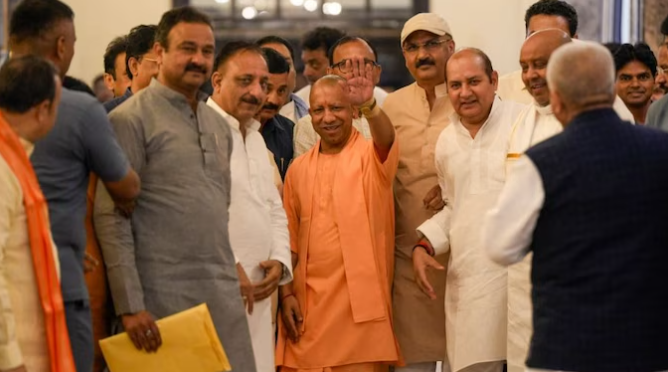Prohibition of Unlawful Conversion of Religion (Amendment) Bill, 2024 (GS Paper 2, Governance)

Context
- The Uttar Pradesh Government has introduced the Prohibition of Unlawful Conversion of Religion (Amendment) Bill, 2024, aimed at tightening the state’s existing anti-conversion law.
- This amendment seeks to enhance the stringency of the Prohibition of Unlawful Conversion of Religion Act, 2021, which already regulates and restricts religious conversions under certain conditions.
Uttar Pradesh’s Prohibition of Unlawful Conversion of Religion Act, 2021
The 2021 Act prohibits religious conversions achieved through:
- Misrepresentation
- Force
- Undue Influence
- Coercion
- Allurement
- Fraudulent Means
Conversions conducted through marriage or relationships are also deemed illegal under the Act. The law provides that any aggrieved individual or their relatives can file a First Information Report (FIR) for alleged illegal conversions.
Penalties Under the Act:
- Standard Punishment: 1-5 years imprisonment and a minimum fine of Rs. 15,000.
- Enhanced Penalty: For victims who are women, minors, or members of Scheduled Castes (SCs) or Scheduled Tribes (STs), the punishment ranges from 2-10 years with a fine of at least Rs. 25,000.
- Mass Conversions: In cases of mass conversions, the punishment ranges from 3-10 years imprisonment and a minimum fine of Rs. 50,000.
Process for Conversion:
- First Declaration: The person wishing to convert must submit a declaration to the District Magistrate affirming that the conversion is voluntary and free from coercion, undue influence, or allurement.
- Police Inquiry: The Magistrate ensures that a police inquiry is conducted to verify the "real intention" of the conversion.
- Second Declaration: The individual submits a second declaration with personal and religious details along with the conversion ceremony specifics. The District Magistrate posts this declaration on a public notice board for potential objections.
Key Amendments Proposed
The Prohibition of Unlawful Conversion of Religion (Amendment) Bill, 2024 proposes several key changes:
- Increased Punishment: The maximum imprisonment term is proposed to be increased from 10 years to life imprisonment.
- Wider Scope for Complaints: Any individual, not just those directly affected, would be allowed to file complaints.
- Tougher Bail Conditions: It proposes making bail more difficult for those accused under this law.
Arguments Against the Law
- Constitutional Concerns: Critics argue that the law infringes on fundamental rights such as freedom of religion and privacy. It is viewed as an overreach by the state into personal religious choices.
- Ambiguity in Definitions: The Act’s definitions of “coercion,” “fraud,” and “allurement” are criticized for being vague, which could lead to arbitrary enforcement and misuse.
- Impact on Interfaith Relationships: There is concern that the law may be used to target interfaith couples, especially those involving Hindu-Muslim relationships, by alleging forced conversions.
- Burden of Proof: The Act places the burden of proof on the accused, requiring them to demonstrate that the conversion was voluntary, which some argue is unjust and contrary to natural justice principles.
- Social Polarization: The law might exacerbate communal tensions and polarize communities along religious lines, potentially increasing social discord.
Arguments in Favour of the Law
- Prevention of Forced Conversions: The Act aims to prevent conversions achieved through coercion or fraud, protecting vulnerable individuals, especially women and marginalized communities.
- Preservation of Social Harmony: Regulating religious conversions is seen as a means to maintain social harmony and prevent inter-community tensions.
- Deterrence Against Conversion Rackets: The law is intended to deter conversion rackets and fraudulent organizations that exploit individuals for various gains.
- Promotion of Responsible Religious Freedom: Supporters view the Act as a balanced approach to ensuring ethical and transparent conversions while safeguarding religious freedom.
- Public Sentiment: The law reflects the concerns of a significant portion of the population in Uttar Pradesh, where issues related to religious conversions are contentious.
Way Ahead
- The Uttar Pradesh government defends the amendment as a necessary measure to prevent forced conversions and safeguard individual rights.
- However, the law faces significant criticism and legal challenges. Its future may hinge on judicial scrutiny and potential amendments to address concerns raised by critics.
- Balancing the protection of individual rights with the need for regulation will be crucial in shaping the final outcome.


